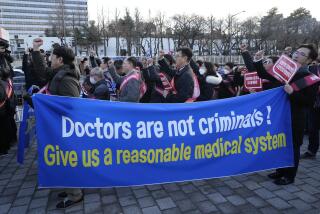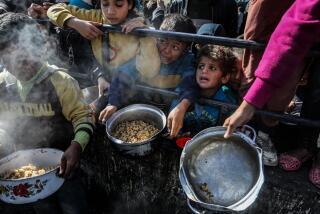Syria activists keep parallel medical system supplied
In an apartment on the outskirts of the Syrian capital, an opposition activist retrieves stashes of medicine and bandages from hiding places.
“What we need most right now are empty blood bags, oxygen masks and tetanus shots — and also a heart defibrillator,” says the medical volunteer, tallying packages of antibiotics soon to be channeled out to protest strongholds.
The trick is to move the supplies quickly so no evidence remains if security forces raid the premises, says the activist, who, like others interviewed, declined to be named for security reasons.
As casualties mount inSyria’scivil conflict, the opposition has developed a makeshift, but nonetheless sophisticated, parallel medical system in a country where medical care, like so much else, has become contested terrain. Each side in the conflict has accused the other of targeting physicians.
For the opposition, hospitals and clinics are no-go zones because wounded demonstrators and rebels risk arrest and torture there.
So clandestine field clinics, often set up in private homes, have evolved into an underground care network that has been celebrated in media accounts from the battle-scarred city of Homs and elsewhere.
The opposition’s secret clinics, however, could not operate without an illicit supply chain funneling medicine and other medical necessities to the protest hubs.
It is extremely dangerous work.
After a crackdown on doctors working with the opposition, activists say, the authorities are now focusing on those who collect medicine and other essentials and coordinate transport to antigovernment strongholds. Activists must work in secrecy; they live in fear of ubiquitous government informants.
“The regime is actually targeting those who are trying to send help,” said Nadja, a woman in her 20s who is involved in relief efforts and says a close friend was recently arrested.
“All these people are dying, and I am just here trying to send help,” said Nadja, who asked that her surname not be used for security reasons.
Last month, seven Syrian volunteers attempting to take medical aid and equipment into Homs’ besieged Baba Amr district were found “executed,” and their supplies, including a respirator, were missing or strewn along the road near their bodies, said the nongovernmental group Avaaz, which trained several of the rescue team members as paramedics. All had been shot, with their hands tied behind their backs, according to the New York-based group, which has been helping to smuggle medical supplies into Syria from neighboring Lebanon.
Avaaz blamed the Syrian military for the killings. There was no response from Syrian officials.
In the authorities’ view, the medical activists are collaborators in sedition against the government of President Bashar Assad. They are enabling, and prolonging, the armed rebellion.
“The ones who are providing aid are considered a million times more dangerous” than the rebels, said an opposition activist speaking via Skype from the rebel bastion of Homs. “From the regime’s perspective, they are extending the ‘terrorists” lives.”
On a recent day, Nadja and her friends sat on mattresses scattered on the floor of an apartment near Damascus. Knocks on the door were constant, with people coming and going. A small table was covered with teacups, overflowing ashtrays and a package of muffins. Cigarette smoke hung heavy in the room.
The opposition activists here support the rebels’ goal of ousting Assad. But many are disillusioned by the uprising’s violent turn, its inexorable evolution from street protests to armed insurgency. It is a common enough sentiment here in the edgy capital, an island of relative calm amid the national turmoil.
“Personally, I felt terribly disappointed; this is not representing me anymore,” Nadja said of the increasingly violent nature of the rebellion.
Chagrined by the transformation, she said this group of activists shifted its focus from “toppling the regime into aid and humanitarian support.”
They no longer go to protests, Nadja says, instead putting their energies into trying to help through humanitarian deeds. She blames the government for brutally crushing the initial protests and, in her view, pushing the uprising down the path of armed resistance.
Another knock on the door and the room goes quiet. One person gets up and peeks through the peephole. A young man in his early 20s comes in and switches on his laptop.
“Blood bags, they need empty blood bags,” he says, referring to the latest intelligence coming from makeshift clinics.
Although official blood banks are off-limits, volunteer blood donors are plentiful. But there is a dearth of the plastic bags in which blood is stored for transfusions. A simple thing, but indispensable.
Funds for the underground supply chain come from various sources, not all of them clear. In some cases, money is raised secretly from individuals. Some are opposition sympathizers. Others live in strife-ridden areas or have relatives or friends who do. Others just wish to help the wounded.
Getting the needed material is a challenge in itself. Activists lay out one strategy after another, some more clandestine than others. Supplies are sometimes available in pharmacies in neighborhoods known to be sympathetic to the uprising. But to go into a random pharmacy in Damascus and ask for 30 packages of painkillers and bandages would be too suspicious, so buyers get small amounts of what is needed at many shops.
“Usually they know someone [in a pharmacy] or people collect money from other people for places like Homs, and someone goes and buys the supplies,” said Lina, a 20-year-old student and opposition activist who also asked that her last name not be used. “They don’t bring it from one [pharmacy]; they buy from several pharmacies and more than one supermarket.”
A reporter was shown a multi-page list, typed in Arabic in neat columns, tallying what medicines and supplies were most urgently needed, ranked on a 1-to-10 scale. Painkillers, surgical supplies and plastic bags to store blood were all high on the list.
Some of those involved in the humanitarian chain are ordinary people who help by donating money or gathering medicines. Others are part of specialized opposition committees whose job it is to deliver the aid, often the most hazardous part of the enterprise. Security checkpoints ring opposition hotbeds such as the cities of Homs and Hama, as well as rebellious suburbs of the capital.
Those making the deliveries must have convincing cover stories or risk searches that could land them in detention, facing interrogation by the secret police.
Despite her misgivings about the escalating violence, Nadja says she is convinced that the movement will never surrender. Too much blood has been spilled, she says. And more bloodshed is inevitable, underlining the need for medical and humanitarian assistance.
“There is no going back,” Nadja said. “Nobody is planning to go back.”
Sandels is a special correspondent.
Times staff writer Patrick J. McDonnell in Beirut contributed to this report.
More to Read
Start your day right
Sign up for Essential California for news, features and recommendations from the L.A. Times and beyond in your inbox six days a week.
You may occasionally receive promotional content from the Los Angeles Times.






